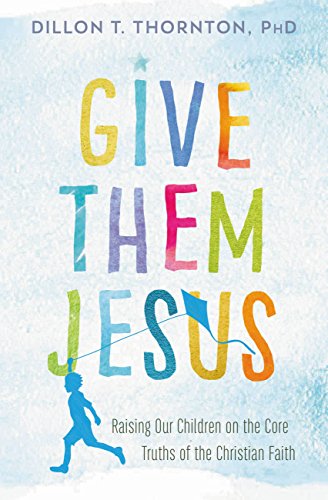Give Them Jesus: Raising Our Children on the Core Truths of the Christian Faith
Written by Dillon T. Thornton Reviewed By Bill SalierThis is a book with its heart in the right place. Give Them Jesus starts from the conviction that it is parents who bear the primary responsibility for their children’s spiritual development. This may well occur in the context of a church, but the responsibility lies first with the parents: the family is the first church.
After briefly establishing this foundation, Thornton then suggests that while most Christian parents acknowledge this responsibility, a majority spend little or no time discussing spiritual truths with their children. The reason offered for this is that their own grasp of the content of the Christian faith is shaky. Give Them Jesus aims to address this problem by encouraging and equipping “parent-theologians” who are better able to instruct their children in Christian truth and lead them to be disciples of Jesus.
Give Them Jesus does this by presenting an overview of the major basic doctrines of the Christian faith with an eye in their communication to children. The material is arranged according to six topics drawn from the Apostle’s Creed: (1) The Father; (2) The Son: identity and first coming; (3) The Son: death and resurrection; (4) The Son: present ministry and second coming; (5) The Holy Spirit; and (6) The Church.
Each chapter outlines, discusses, and illustrates the core elements of a particular topic. Each treatment proceeds along classical reformed and evangelical lines, with help from writers such as Calvin, McGrath, Lewis, Bray, Morris, and Packer. Thornton sticks to the mainlines of the Bible’s teaching on each topic and while some controversial areas are mentioned, these are not normally engaged (e.g. the timing of Christ’s second coming). Rather, the focus of each discussion is especially on the implications of the topic for Christian life and practice. Helpful illustrations abound. The explanations are simple without being simplistic, and it is clear that what is written reflects the wealth of Thornton’s experience and practice with his own family.
Each topic concludes with a family worship guide. This is the major innovation of the book and reflects Thornton’s conviction that one of the key responsibilities of parents is to lead focused times of instruction within the context of family worship. Thornton gives detailed guidance for what this might look like under the four principles of teach, treasure, sing, and pray. Importantly this is not to replace a whole of life approach to Christian nurture, “every day is a string of teachable moments” (p. 8), but he suggests parents consider a regular time of family worship lasting for between 10–15 minutes for younger children, often around a meal time or bedtime. I think this would adapt and change as children get older.
The guides at the end of each chapter contain concepts to remember (e.g., the various sections of the Apostles’ Creed) as well as memory verses. This is what Thornton means by his principle “treasure.” Then follows a brief summary of the main concepts covered in the more extended discussion, with each providing a possible focus for a time of worship. There is also a series of suggested questions to raise with the family to spark discussion about the topic, as well as a number of suggested songs. Finally, each guide concludes with relevant prayer prompts.
Give Them Jesus is a reliable guide aimed at the average (Christian) parent. It is a kind of entry level systematic theology and would also double as a useful theological overview for leaders working in children’s and youth ministry.
Part of the value of Give Them Jesus lies in the challenge it puts before parents to grow in their knowledge of their faith so they can more effectively, and deliberately, disciple their own children. Its usefulness is in the way it helps parents to do this. While the question is begged as to what this means for children in churches who come from unbelieving families, there are useful clues here for children’s and youth ministers looking for ideas for topics and programs to be used in their groups and activities.
One intriguing sidelight is the choice of songs recommended for the worship times, which mainly consist of older hymns. Questions of language and syntax with younger children aside (e.g., It is Well With my Soul, Crown Him with Many Crowns), are these choices indicative of the relative dearth of more objective content-based songs in the contemporary scene? Perhaps. In my view, however, the author would have done well to cast the net wider to catch some helpful contemporary songs that have been written for younger believers.
Give them Jesus is a well-written and helpful book that identifies a genuine problem in many Christian homes and provides a constructive and thoughtful response.
Bill Salier
Bill Salier
Youthworks College
Sydney, New South Wales, Australia
Other Articles in this Issue
In appreciation for the recent resurgence of interest in biblical theology and typological interpretation, this article considers Jonathan Edwards’s typological interpretive practices and principles...
The Insights and Shortcomings of Kantian Ethics: Signposts Signaling the Truthfulness of Christian Ethics
by Zachary BreitenbachImmanuel Kant proposed what he considered to be the one true ethical system—a system rooted in pure reason, without recourse to grounding morality in God, that sought to explain universal moral truth...
The Doctrine of Scripture and Biblical Contextualization: Inspiration, Authority, Inerrancy, and the Canon
by Jackson WuThis essay explores the relationship between contextualization and an evangelical doctrine of the Bible, with a special emphasis on biblical inspiration, biblical authority, biblical inerrancy, and the biblical canon...
Can We Hasten the Parousia? An Examination of Matt 24:14 and Its Implications for Missional Practice
by C. J. MooreAmong the many possible motivations for mission participation, the eschatological motivation for missions has recently grown in prevalence...
“Striving for Glory with God”: Humility as the Good Life in Basil of Caesarea’s Homily 20
by Coleman M. FordBasil of Caesarea (c. AD 330–379) presents humility as the essence of the good life in his Homily 20...







